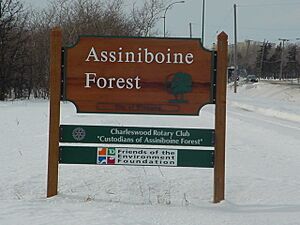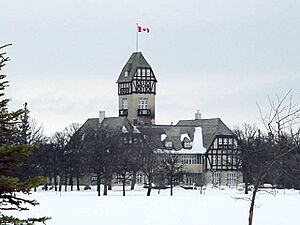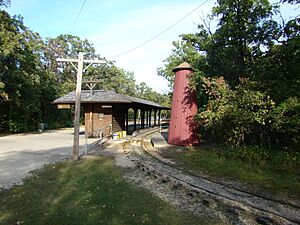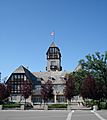Assiniboine Park facts for kids
Quick facts for kids Assiniboine Park |
|
|---|---|
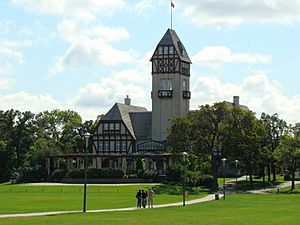
Assiniboine Park Pavilion
|
|
| Location | 55 Pavilion Crescent Winnipeg, Manitoba R3P 2N6 |
| Area | 1,100 acres (450 ha) |
| Created | 1904 |
| Open | July 7, 1908 |
| Public transit access |
|
Assiniboine Park is a huge and exciting park in Winnipeg, Manitoba, Canada. It sits right along the Assiniboine River. This park is a fantastic place for families and friends to explore, learn, and have fun!
The park was first bought in 1904 and officially opened in 1909. It's named after the Assiniboine people, who are a First Nations group. Assiniboine Park is enormous, covering about 1,100 acres. Imagine a park so big that 400 acres of it are designed like a beautiful English garden!
Inside the park, you'll find many cool attractions. There's the huge 700-acre Assiniboine Forest, the Assiniboine Park Zoo where you can see amazing animals, and the historic Assiniboine Park Pavilion. You can also discover lovely gardens, a sculpture garden, a miniature railway, and an outdoor theatre for shows.
Contents
Discover Assiniboine Park's Fun Attractions
Assiniboine Park is packed with exciting things to see and do for everyone. Let's explore some of the most popular spots!
Beautiful Gardens and Amazing Art
The park has several stunning gardens where you can enjoy nature's beauty and incredible artwork.
The English Garden: A Floral Wonderland
The English Garden, created between 1926 and 1927, is famous across North America for its thousands of colorful flowers. It covers almost 3 acres with flowers, shrubs, and trees arranged in a traditional English style. This garden was designed to show off special flowers that grow well in Manitoba. You can visit the English Garden for free every day of the year.
The Formal Garden: Perfect Shapes
Near the park's southeast entrance, you'll find the Formal Garden. It was designed in 1907 and features flower beds in neat, geometric shapes. Everything in this garden is perfectly symmetrical, meaning it looks the same on both sides.
Leo Mol Sculpture Garden: Art in Nature
The Leo Mol Sculpture Garden is a special place that shows over 300 artworks by Dr. Leo Mol. You can see bronze and ceramic sculptures, paintings, and drawings here. This garden first opened in 1992 and has been made even bigger twice since then.
The Conservatory: A Look Back in Time
The Conservatory was once a major indoor attraction, like a giant greenhouse. It housed over 8,000 plants and flowers that don't usually grow in Manitoba. The original Palm House was built in 1914, and a modern building was added around it in 1968. However, due to high repair costs, the Conservatory closed permanently in April 2018 and was later taken down. There were discussions about a new "Diversity Gardens" project, which might have an admission fee like the Zoo.
The Famous Pavilion and Outdoor Stage
Assiniboine Park Pavilion: A Historic Landmark
The Assiniboine Park Pavilion is a well-known building and a symbol of the park. The first pavilion was built in 1908 and was a popular spot for dancing and banquets. It had a 90-foot tower that helped with the park's water system. Sadly, it was destroyed by fire in 1929. The current, larger pavilion opened in 1930 and is now one of Winnipeg's most recognizable landmarks.
The Lyric Theatre: Outdoor Shows
Right next to the Pavilion is the Lyric Theatre, a big outdoor stage. It opened in 1999 and continues a tradition of outdoor entertainment that started in the 1920s. You can often catch live performances here!
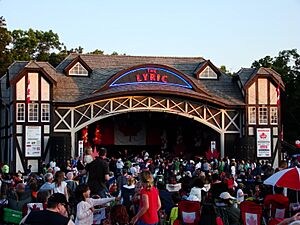
Meet the Animals at the Zoo
Assiniboine Park Zoo: Home to Many Creatures
The Assiniboine Park Zoo is located at the western end of the park. It covers about 90 acres and is home to more than 300 different kinds of animals! The zoo first opened its doors in July 1908, making it one of the park's oldest attractions.
Playtime at the Children's Playground
Children's Nature and Adventure Playground
Opened in May 2011, the Children's Nature and Adventure Playground is a fantastic play area covering 2 acres. It's located near the Pavilion and cost $6 million to build. This playground has a special kid-sized doorway, but adults can get through too! You'll also find the famous Winnie-the-Pooh statue inside this fun area.
Trains, Ducks, and More!
Historic Locomotive Display
Near Roblin Boulevard, you can see a real steam locomotive, CNR 6043. This train was the last steam locomotive to run regular service in Canada and is now on display thanks to the Winnipeg Railway Museum.
Assiniboine Park Railroad: A Miniature Ride
In another part of the park, there's a narrow gauge railway called the Assiniboine Park Railroad. You can take a ride on this miniature train, which even has a working steam locomotive!
The Serpentine Duck Pond
Towards the north of the park, you'll find the serpentine duck pond. It was updated in the 2010s with new plants and benches. Even though it's called a duck pond, you'll often see Canada geese swimming there.
Picnic Areas
The park also has many lovely picnic areas where you can enjoy a meal outdoors with your family and friends.
The Footbridge
A bridge connects the main part of Assiniboine Park to the St. James area across the Assiniboine River. This bridge is for walking and biking and was officially opened in May 1932. It makes it easy for people from Portage Avenue to get to the park.
Get Active at the Park
Assiniboine Park is a great place to stay active! It has playgrounds, a bicycle path, and fields for baseball and cricket. There are three cricket pitches and a clubhouse, making it a top spot for cricket in Manitoba.
The Terry Fox Fitness Trail is also in the park. This trail is designed for everyone, including people with disabilities, to enjoy exercising. Assiniboine Park is easy to get around for people using wheelchairs.
Protecting the River Forest
The Assiniboine Park Riparian Forest Project is an important effort to help the forest along the Assiniboine River. This project, which started in 2006, works to restore the riverbank and make the walking trails even better.
Over many years, the forest has faced challenges like flooding, invasive plants, and damage from people walking and biking. This has led to a lot of trails, packed-down soil, and bare ground. The project aims to fix this by planting trees, removing harmful plants, and creating a main trail. The goal is to make sure this beautiful natural area can be enjoyed for many generations to come.
Gallery
See also
- List of botanical gardens in Canada
- Winnipeg arts and culture
 | Jewel Prestage |
 | Ella Baker |
 | Fannie Lou Hamer |


